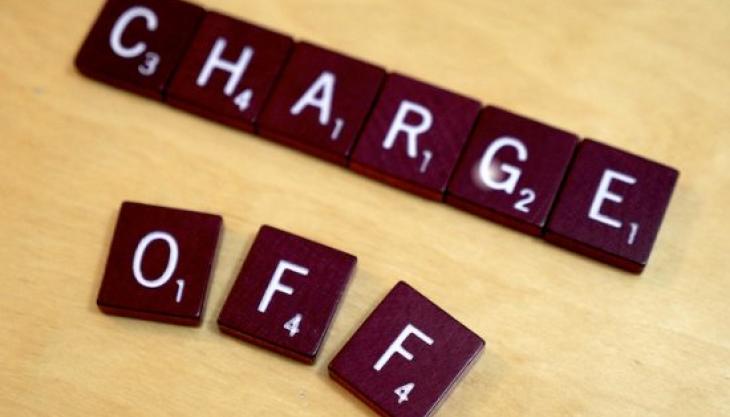What Is Charged Off Debt and Do You Still Owe It Once It's Written Off?
Submitted by Rachel R on Mon, 01/19/2015 - 11:06am

What happens with charged off debt?
Image source: Flickr user Simon Cunningham
After you don't pay on a debt for six months, the holder of the debt may charge it off. This is an accounting term which means the company that loaned you the money (whether it's credit card debt, a medical bill or other type of debt) has recognized that you likely won't pay the debt and they don't want to keep it on their books anymore. This does not mean that the debt is gone or that the company won't do something about it. It's just against accounting rules to keep uncollectible debt among the assets on a company's financial reports.
What happens to charged off debt?
Large companies may have a separate division that handles unpaid debt while other companies may sell off bad debt to companies that specialize in buying and collecting on this type of debt. Either way, you may not even know that your debt was charged off unless it's noted this way on your credit report. Charged off debt is rarely left to die a death without any action being taken. Some company or other will pursue you for it and there are only three ways for it to go away:
- Wait for the statute of limitations to expire so the debt collector can no longer sue you over the debt. In North Carolina, this is three years from the date of last activity for credit cards, car loans and other installment loans – medical bills will range from three to 10 years depending on whether the provider was private or public.
- Wait for it to fall off your credit report. This is typically seven years from the date of last activity on the debt.
- Pay it. You may be able to negotiate a lower settlement amount. However, know that if you negotiate a payment plan and then can no longer make the payments, the statute of limitations and date the debt will fall off your credit report will shift and the clock will start on the date of your last payment.
- Discharge it in bankruptcy. Many types of unsecured debt can be completely eliminated in Chapter 7 bankruptcy – this includes medical bills, credit cards, remaining balances on car loans when the car has been repossessed and installment loans. Student loans may be dischargeable in bankruptcy, but only under certain conditions and only if you take extra steps in the bankruptcy process.
How does charged off debt affect your credit report?
There are a number of concerns with charged off debt on your credit file and you need to stay on top of these. Charged off accounts create a second entry on your credit report. You will have the initial entry from the company that gave you the credit. They will (in most cases) show the account as charged off. When the collection company buys the account, they add another entry to your report that shows the debt in collections. This may not seem fair, but it's how it goes. If your debt is sold again, there may even be a third entry associated with it.
If you pay a negotiated lower amount to settle the debt, the debt collection company may not show it paid off, but may still show a balance owing. If so, you need to ask the collector or credit reporting agency to correct it. It's important to always get negotiations in writing so you can prove it later if there's an error on your credit report. You may have to get other entries corrected if the debt was sold more than once and each purchases recorded an entry on your credit file.
Both the original debt and the collection account will hit your credit score and lower it. They will both stick around for seven years from the initial date of delinquency. You must be vigilant to get these removed from your credit report when they hit the seven year mark, but may need to prove when the last activity occurred to do so.
If you have a pile of debt you can't pay and are not likely to be able to pay, filing bankruptcy may be something to consider. Debt discharged in bankruptcy is better on your credit score than charged off debt. Charged off debt sitting in collections will keep your credit score lower and lower for longer than will a bankruptcy.
Contact the law offices of John T Orcutt to find out how a North Carolina bankruptcy can help you deal with charged off debt. Call us at +1-833-627-0115 to schedule a free consultation at one of our convenient NC locations in Raleigh, Fayetteville, Durham, Wilson, Greensboro or Garner. Be sure to ask about our zero down bankruptcy deal.
Debts Hurt! Got debt? Need help? Get started below!
Serving All of North Carolina
- Bankruptcy Attorneys Raleigh NC (North)
- Bankruptcy Attorney Fayetteville NC
- Bankruptcy Attorney Durham NC
- Bankruptcy Attorneys Wilson NC
- Bankruptcy Attorneys Greensboro NC
- Bankruptcy Attorneys Southport NC
- Bankruptcy Attorneys Wilmington NC
Bankruptcy Attorneys Raleigh NC (North)
6616 Six Forks Rd #203 Raleigh, NC 27615 North Carolina
Tel: (919) 847-9750

Bankruptcy Attorney Fayetteville NC
2711 Breezewood Ave Fayetteville, NC 28303 North Carolina
Tel: (910) 323-2972

Bankruptcy Attorney Durham NC
1738 Hillandale Rd Suite D Durham, NC 27705 North Carolina
Tel: (919) 286-1695


Bankruptcy Attorneys Greensboro NC
2100 W Cornwallis Dr. STE O Greensboro, NC 27408 North Carolina
Tel: (336) 542-5993

Bankruptcy Attorneys Southport NC
116 N Howe St. Suite A, Southport, NC 28461 North Carolina
Tel: (910) 218-8682

Bankruptcy Attorneys Wilmington NC
116 N. Howe Street, Suite A Southport, NC 28461 North Carolina
Tel: (910) 447-2987
